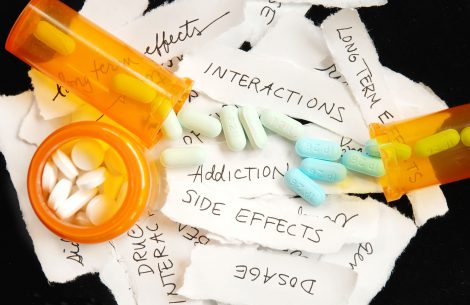One of the most important things you should consider when are taking medications, herbs or just about anything is how they interact with each other, and whether they can have complications that can harm you.
The danger is that with different types of medications even regular doses may become an overdose, depending on the interaction.
It’s important that everyone learns about their medications and become aware of the herbs they use, the supplements they take, and their response to them. It is best to check with responsible professionals and providers.
Herbs
Some of the herbs used in Chinese medicine may be safe, but others can interact with drugs and have serious side effects or be unsafe for people with certain medical conditions. Some of the most serious drug interactions involve prescription medications and supplements.
That is becoming increasingly important as the popularity of herbal medicine increases. The World Health Organization estimates that 80 percent of the world’s population uses herbal medicine. Many Americans, not happy with Western medicine for their ailments, have turned to alternative and complementary medicine, studies show.
Regulations
Herbal medicines used in Traditional Chinese Medicine are sometimes marketed in the U.S. as dietary supplements. The U.S. Food and Drug Administration regulations for dietary supplements are not as stringent as for over the counter medications. The supplements are not as likely to have the same regulations as those for over the counter drugs. Supplements are also not as likely to be listed in a database of drug interactions.
Herbal Supplements and Drug Interactions
Nearly 25 percent of U.S. adults report also taking a prescription medication with a dietary supplement, according to an American Academy of Family Physicians study.
Herbal interactions with prescription medications can interfere with how the drug may be broken down in the body, enhance side effects of prescription medications, or block the intended therapeutic effect of a drug.
Herb-drug interactions are complicated because many chemical components can be involved, and these compounds may possess diverse pharmacological activities, according to a study of the issue.
The interactions potentially cause changes in drug levels and drug activities, which can sometimes have dire consequences. Even though herbal supplements may be from plants, the ingredients can be chemical-related. As a result, herbal supplements may have drug interactions, not only with each other, but food or alcohol. And there may be no safety warnings so it may be difficult for someone to know if there is an interaction.
Different kinds of drug interactions
Some supplements, such as St. John’s Wort and Goldenseal, are known to cause drug interactions. As a result, they should be avoided with any pharmacological products.
Yet some supplements may cause interactions with some medications, but are safe with others, such as curcumin, Echinacea, garlic, Asian ginseng, green tea extract, and kava kava.
The kinds of interactions
Drug interactions can be in both pharmcokinetics and pharmacodynamics terms. Pharmacokinetics, sometimes described as what the body does to a drug, refers to the movement of drugs in, through and out of the body. Pharmacodynamics is the reverse: what a drug does to the body, such as the biochemical and molecular impacts.
Herbs may affect the behavior of a drug used at the same time by changing their absorption, distribution, metabolism and excretion.
Contamination of herbs
The National Center for Complementary and Integrative Health says there have been reports of Chinese herbal products being contaminated with drugs, toxins or heavy metals not containing the listed ingredients.
The Chinese herb ephedra (ma huang) has been linked to serious health complications, including heart attack and stroke. In 2004, the FDA banned the sale of ephedra-containing dietary supplements, but does not include Traditional Chinese Medicine remedies.
Interaction Examples
There are a host of interaction issues involving herbs and pharmaceuticals, with many related to bleeding, according to Drugs.com.
Among the herbs which could have potentially negative impacts in interactions with drugs:
Evening Primrose Oil
The flowering plant Evening primrose is known by other names such as Oenothera biennis, scabish, or King’s cure-all. Drugs or herbs that have the potential to thin blood may have a reaction with Evening Primrose Oil.
American Ginseng
Ginseng has been used for many purposes, ranging from stress to endurance. There are many different kinds of ginseng, but American ginseng has a blood thinner impact and may decrease the effectiveness of blood-thinning medications, and also should not be used with anticoagulants.
Ginkgo Biloba
Ginkgo Biloba has been used for dementia, Alzheimer’s disease and related ailments, but it may impact patients who take blood thinners, diabetes drugs or seizure medications. Ginkgo has been known to have interactions with about 500 drugs.
Goldensea
Goldenseal, also a flowering herb, is used for a range of conditions, including cold, flu and skin ailments, but there are dozens of drug interactions linked with goldenseal.
Green Tea
Green tea has been used for many health related issues, such as being an antioxidant. But it should not be used in connection with some blood-thinning drugs.
Getting advice from healthcare providers
Healthcare providers can give the best advice for any serious health impacts from drug interactions.
Advice to providers
Clinicians have been told they should consult reliable dietary supplement resources, or clinical pharmacists or pharmacologists, to help assess the safety of specific herbal supplement – drug combinations. Often, patients do not mention supplements they use to clinicians.
References:
- 18 Herbal Supplements With Risky Drug Interactions, medically reviewed, L. Anderson, PharmD, Drugs.Com
- Asher, G, Corbett, A, et al. Common Herbal Dietary Supplement-Drug Interactions.
- American Family Physician. 2017. July 15; 96 (2): 101-107.University of North Carolina, Chapel Hill, NC.
- Singh, A, Zhao, K. Herb-Drug Interactions of Commonly Used Chinese Medical Herbs.
- International Review of Neurobiology. 2017. 2017;135:197-232. doi: 10.1016/bs.irn.2017.02.010. Epub 2017 Apr 14.
- https://www.healthline.com/health/drug-interactions
- https://nccih.nih.gov/health/whatiscam/chinesemed.htm

